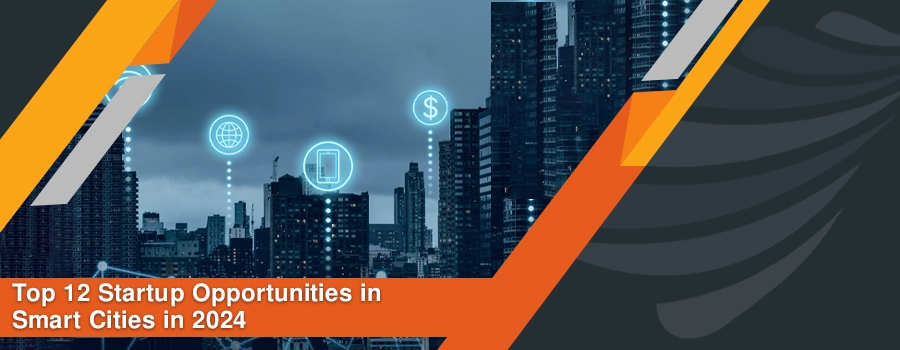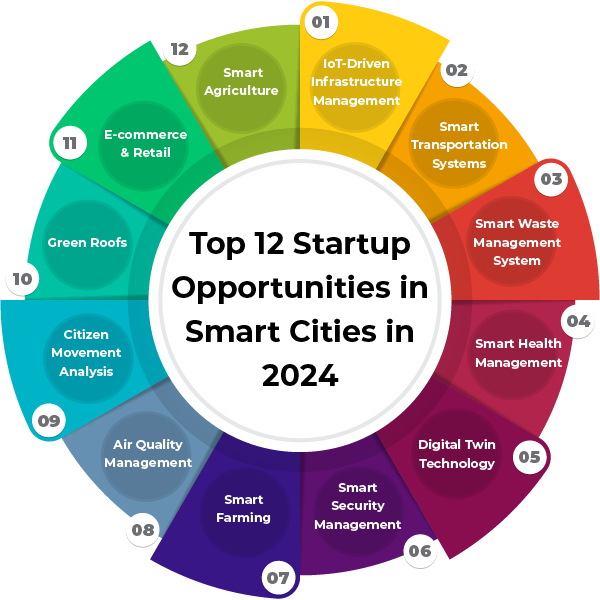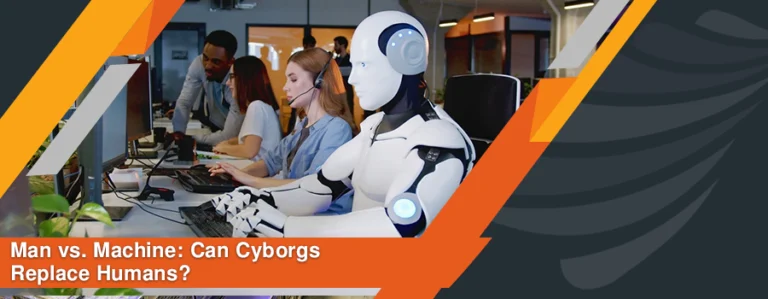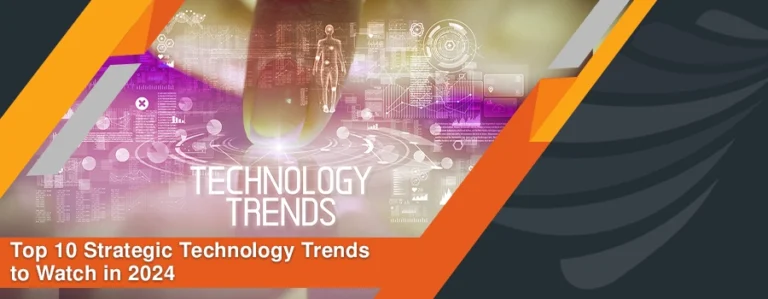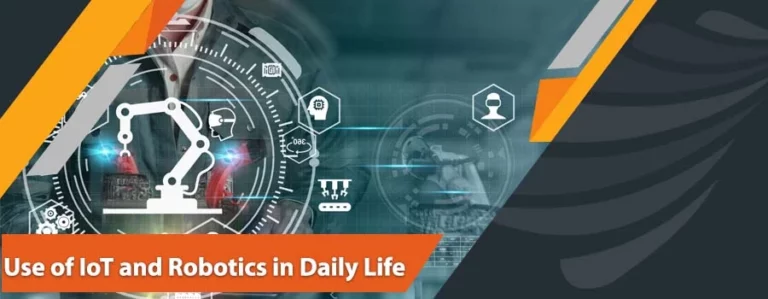In the grand tapestry of technological evolution, the smart city stands as the jewels of innovation, boosting sustainability, connectivity, and efficiency and providing millions of startup opportunities. As you dive into 2024, you will see several new startup projects, and to stand out, you need to learn about the importance of technological upgrades and dependence on innovation.
Amidst the evolving landscape, you are at the place where the road to success is paved with technological upgrades, research and development, and dependence on innovation and visionary ideas.
We welcome you to the place where you can explore the top 12 start-up opportunities to secure your future and stand out in the upcoming competitive market. Whether you seek inspiration to start your own business or boost an existing one, you will get innovative ideas and complete guidance here.
Top 12 Startup Opportunities in Smart Cities in 2024
1. IoT-Driven Infrastructure Management
The development of smart cities depends highly on the intricate, interconnected network of smart devices – the Internet of Things (IoT). With real-time data collection, IoT allows the development of intelligent urban structures, predictive maintenance, efficient resource allocation, and smart decision-making. You can avail the best services, from smart parking and waste management to a smart healthcare system.
Entrepreneurs play a major role in the development of urban landscapes. They can develop trending IoT products with advanced features like driverless cars, smart home automation, smart sensor monitoring systems, and many more.
Early-stage startups with IoT implementations can increase their business performance, productivity, and efficiency. With predictive analyses and integration of interconnected networks, they can improve decision-making and gain a sustainable competitive advantage.
2. Smart Transportation Systems
An intelligent transportation system is a breakthrough in smart city planning. It is a combination of different advanced solutions that help to manage parking, reduce greenhouse gas emissions, enhance security, cope with traffic congestion, and increase ease for drivers.
Smart parking systems like ParkSmart automates parking systems, allowing drivers to easily navigate the nearest parking spot, book it, and pay parking charges online via smartphone. Also, the implementation of license plate recognition like OLIOS-LPR helps enhance the security of vehicles. It scans the license plates of the vehicles and compares them with the database networks to catch unauthorized cars.
Startups entering the smart mobility arena have an opportunity to reshape the way people navigate cities. Whether it’s through introducing efficient last-mile solutions or integrating various modes of transportation into a seamless platform, the potential for disruptive innovation is immense.
Entrepreneurs can introduce new facilities for driver’s ease and traffic management. They can integrate different intelligent modes of transportation, like smart public transport, allowing users to track the bus, book it, and reach the bus spot on time.
3. Smart Waste Management System
Waste management is an ever-growing problem, but developing smart solutions contributes positively to it. Early-stage startups take this challenge as an opportunity and integrate smart waste management solutions that leverage data analytics, IoT sensors, and Artificial Intelligence (AI). Implementation of such a system helps to reduce pollution and enhance environmental sustainability.
One example of such implementation is the development of BinWise – a smart waste management solution planned to be implemented in different public places in the United States. It has waste level detection sensors that continuously measure and monitor the fill levels in the waste bins. When the bins are filled and reach the threshold level, alerts are sent to the facility managers via the web application. It allows the waste managers to empty the bins only when needed and helps reduce traffic congestion, fuel consumption, and greenhouse carbon emissions.
4. Smart Health Management
Around 95% of the world population has health issues, highlighting the importance of advancing healthcare facilities. The emergence of technological revolutions like AI, IoT, augmented reality (AR), virtual reality (VR), blockchain, and cloud computing has assisted in treating patients with a modern approach.
AI and IoT collaborate to offer remote patient support, enabling continuous real-time tracking of patients’ health parameters. To provide patients with a seamless healthcare experience, augmented reality (AR) and virtual reality (VR) are essential since they enable doctors to do comprehensive examinations and consultations without requiring patients to visit the office. Blockchain offers an incorruptible and transparent system that protects sensitive medical data, guaranteeing the highest level of security for patient data.
In the meantime, cloud computing makes it easier for medical professionals to store, access, and share data easily, enabling them to make well-informed judgments based on complete and current information. These technologies offer effective, safe, patient-centered solutions that revolutionize smart health management.
Startups in the ever-changing field of Smart Health Management startups have huge opportunities to redefine urban planning. With the introduction of digital twins, telemedicine platforms, AI-driven health monitoring, and creative telemedicine platforms, entrepreneurs are leading the way in changing the way cities handle healthcare delivery. A more tech-driven, proactive, and accessible approach to healthcare is opening the door to a healthier urban future.
5. Digital Twin Technology
With the potential to significantly alter smart city development, digital twin technology offers an ideal environment for startup growth. Predictive maintenance of smart infrastructure is one of the most interesting areas for new ventures. Startups can enable cities to proactively address maintenance needs by creating digital twins replicating the real-time situation of infrastructure components, such as roads, utilities, and bridges. This prolongs the useful life of assets and averts expensive and disruptive malfunctions.
The optimization of energy use presents another opportunity for entrepreneurs operating in the context of digital twins. Startups can use simulations to find energy inefficiencies and suggest ways to address them by modeling buildings virtually. This supports sustainability objectives.
Also, startups can focus on creating interoperable and scalable digital twin platforms that diverse city departments can adopt. Integrating various data sources and providing a comprehensive view of the city’s digital twin fosters collaboration among transportation, energy, and public safety sectors.
6. Smart Security Management
Smart security management is essential to transform contemporary urban environments into smart cities. The growing urban population’s demand for creative and effective security solutions is rising. By utilizing cutting-edge technology like data analytics, IoT, and AI, smart security systems can proactively detect and address possible threats.
By combining sensors, cognitive algorithms, and surveillance cameras, these systems improve situational awareness and enable quicker, more efficient responses to security issues. With real-time data analytics, smart security management enhances the resilience and overall effectiveness of smart city infrastructures while guaranteeing the safety of its inhabitants.
One example of a smart security system is AssetGuard, a fence-mounted intrusion detection system. It uses sensors to detect fence vibrations generated by intrusion attempts made by climbing, lifting, or cutting the fence.
7. Smart Farming
Technology is driving a revolution in agriculture through smart farming, which integrates digital technologies to maximize production, sustainability, and resource efficiency. For example, precision farming uses sensors, GPS, and data analytics to monitor and control crop production with high accuracy. Drones used in agriculture add even more efficiency to farming operations by giving real-time aerial data for yield forecasts, pest management, and crop monitoring. The convergence of these technologies encourages more resource-efficient and sustainable farming methods and increases agricultural productivity.
In this era of Smart Farming, numerous startup opportunities abound. Entrepreneurs can explore developing innovative software platforms for farm management, creating advanced sensor technologies for monitoring soil health or designing specialized drones for agricultural purposes.
Additionally, data analytics startups can thrive by offering insights derived from the vast data generated by precision farming technologies. As the demand for smart and sustainable agriculture continues to rise, startups in the digital transformation of farming practices stand to make significant contributions to the agricultural industry.
8. Air Quality Management
The general health of ecosystems and public health is directly impacted by the quality of the air we breathe. Comprehensive air quality management aims to monitor, evaluate, and manage air pollutants through legislative actions, technological advancements, and public education campaigns. This comprehensive strategy seeks to lessen the harmful impacts of contaminants such as sulfur dioxide, nitrogen dioxide, particulate matter, and volatile organic compounds.
In the startup landscape, opportunities abound for entrepreneurs to contribute to innovative solutions in air quality management. Developing and deploying advanced sensor technologies for real-time air quality monitoring, creating data analytics platforms to analyze pollution trends, and designing low-cost, user-friendly devices for personal air quality assessment are just a few areas where startups can significantly work.
Additionally, there is a potential for startups to specialize in pollution control technologies, such as improved filtration systems and sustainable energy solutions, to reduce emissions from various sources. As societies worldwide increasingly prioritize environmental sustainability, startups in the air quality management sector are well-positioned to address the global demand for cleaner and healthier air.
9. Citizen Movement Analysis
A rapidly developing subject called “citizen movement analysis” uses data-driven insights to understand and improve the dynamics of human mobility in urban environments. This field uses information from various sources, such as GPS units, cell phones, and public transit networks, to interpret patterns of citizen movement. Informed decision-making for emergency responders, transit authorities, and city planners is easier when they better understand how people use and navigate public places. This leads to more responsive and efficient urban environments.
There are many chances for innovation in citizen movement analysis that startups can work on. Entrepreneurs can create platforms or apps that compile and analyze movement data, giving them access to real-time data on traffic patterns, crowd dynamics, and transportation utilization. Startups can also consider developing predictive analytics technologies to help local government authorities optimize services and infrastructure according to changing patterns of citizen migration. Startups specializing in citizen movement analysis are well-positioned to play a significant role in creating more adaptable and livable urban settings as cities develop into smart and connected hubs.
10. Green Roofs
Green roofs, sometimes called eco-roofs, are environmentally friendly architectural solutions that entail growing vegetation on a building’s roof. These green areas can be planted with plant species grown on specific growing media, such as herbs, grasses, or small trees. Green roofs provide numerous environmental advantages, including increased energy efficiency, better stormwater management, and enhanced biodiversity. Green roofs are an attractive, environmentally friendly choice for urban construction because they reduce the urban heat island effect by absorbing sunlight through flora.
There are lots of prospects for startups in the green roof sector. Entrepreneurs might investigate creating cutting-edge technology for green roofs, like modular systems that facilitate easier installation and upkeep. Furthermore, startups can advise on plant selection, substrate composition, and watering systems to design and implement green roofs. As sustainability becomes an increasingly important focus in urban planning and construction, green roof companies have the potential to significantly contribute to the creation of more resilient and ecologically friendly urban environments.
11. E-commerce and Retail
Within the dynamic realm of E-commerce and Retail Technology, companies are discovering abundant prospects to revolutionize consumer purchasing behavior and business operations. Personalized purchasing experiences are one potential direction. By utilizing data analytics and AI algorithms, startups may improve user interfaces, personalize product recommendations, and give online buyers a more engaging and personalized experience. Encouraging client involvement and pleasure can be greatly increased by integrating cutting-edge technologies, from virtual try-on experiences to personalized product recommendations.
Supply chain optimization is another important area where startups can have a significant impact. The e-commerce ecosystem is made more efficient and sustainable by innovations in inventory management, last-mile delivery, and logistics. Future trends in retail logistics will be largely shaped by startups that tackle issues like shortening delivery times, lowering environmental impact, and improving overall supply chain visibility.
Moreover, the combination of social media and e-commerce offers companies a thrilling prospect. The trend of social involvement in retail can be tapped into by creating platforms—such as influencer marketing, social commerce, and live-streaming shopping events—that seamlessly combine social experiences with online buying. These technologies broaden the scope of e-commerce while fostering a more participatory and neighborhood-based retail setting.
12 Smart Agriculture
A developing field known as “Urban Agriculture Technologies” is dedicated to incorporating cutting-edge approaches into urban settings to promote food production, improve sustainability, and address the problems of cities’ expanding populations. These technologies, such as rooftop gardening, hydroponics, aquaponics, and vertical farming, permit growing in limited urban areas. These technologies seek to lower transportation costs, improve food security, and foster a more resilient and sustainable food system by bringing agriculture closer to urban inhabitants.
There are a lot of startup chances in the field of urban agriculture technologies. Entrepreneurs might investigate creating automated, sensor-equipped “smart farming” systems that maximize crop management and resource efficiency. Entrepreneurs may also develop scalable, flexible vertical farming systems that work well in cities and use available space effectively. Technology-enabled systems that link consumers with urban farmers to provide fresh, locally produced food also offer another opportunity for business endeavors. Urban agriculture technology firms can substantially contribute to building more resilient and self-sufficient urban ecosystems as cities understand the significance of sustainable food production.
Conclusion
Technological evolution and urban development open a gate of opportunities for startups. The ability of startups to tackle difficult urban problems is essential to create smarter and more resilient cities. Startups can provide scalable solutions for problems ranging from citizen mobility and sustainable agriculture to security and air quality through technological innovation and integration. As these endeavors become integral to urban development projects, they gain opportunities to progress their business. Technological startups and urban development have a symbiotic relationship that highlights the potential for positive transformation and fosters more efficient, sustainable, and livable urban settings in the future.

